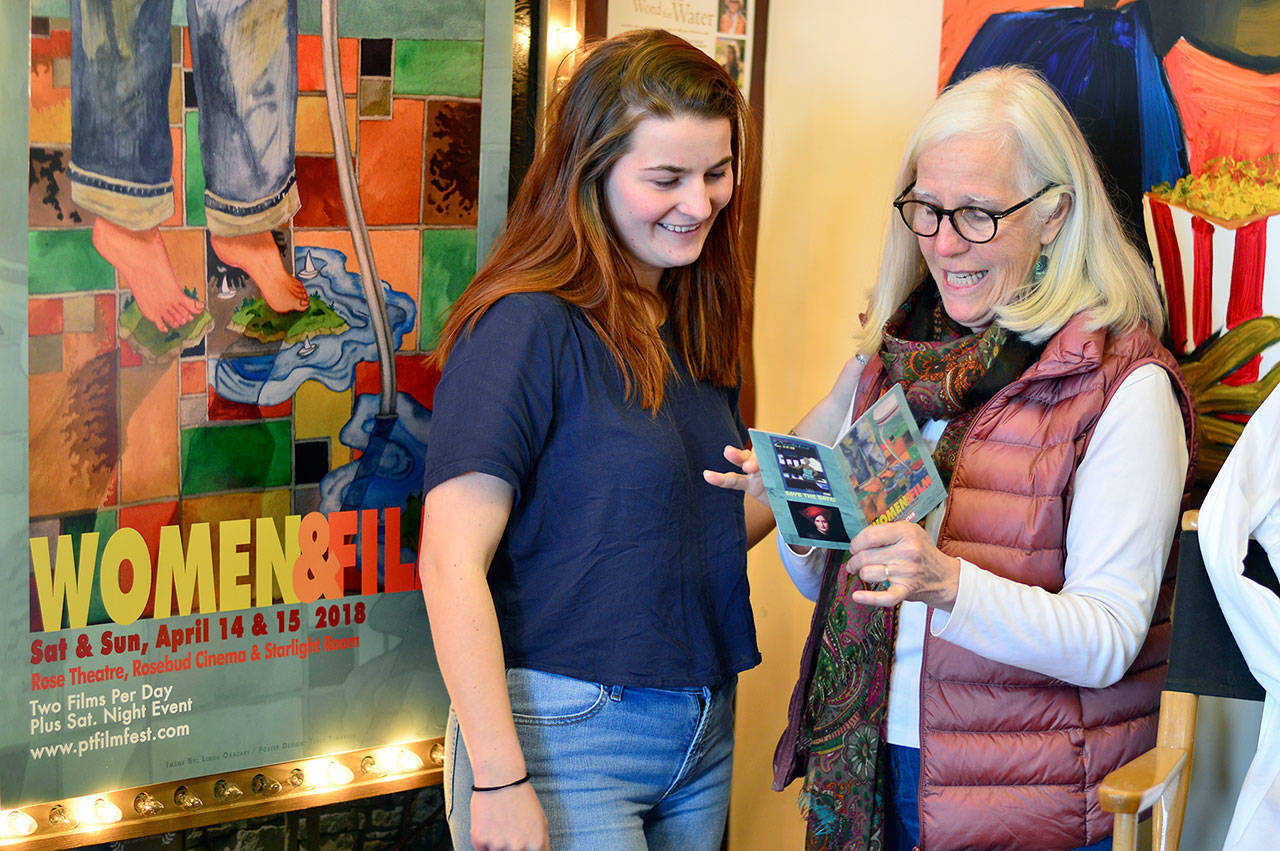PORT TOWNSEND — Maybe you wonder about becoming a Buddhist nun. Or a grower of marijuana. Perhaps you’d love to take a gap year in the mountains of Oregon, or make street art and find love in Australia.
Women — younger, older, white, brown — do all this in 13 movies Saturday and Sunday. They’re the makers and stars of the documentaries and dramas in the Port Townsend Film Festival’s Women & Film lineup, ranging from “Mary Janes: The Women of Weed” to “What If It Works?,” that Australian love story.
Now in its fourth year, the event presents the chance to not only see independent films about a variety of topics, but also have face time with women filmmakers.
“We have a representative for every film except one,” said Janette Force, executive director of the Port Townsend Film Festival.
The weekend’s events include a panel conversation, “Women Speak Out: Filmmakers Break the Rules without Apology,” at 10:30 a.m. Saturday in the Cotton Building, 705 Water St.
It’s an opportunity, Force said, for the women directors and producers to talk about what allowed them to make the nontraditional choice of becoming a filmmaker and develop an artistic voice.
Port Townsend actor Amanda Steerer-Zamora will serve as moderator of the discussion, which will convene six panelists for the first 45 minutes and a second set of six for the second 45 minutes.
The panel takes place amid two days of movie screenings — most at staggered times to allow festivalgoers to move on to another venue if they don’t get into their first choice — at the Rose Theatre and Starlight Room downtown and the Wheeler Theatre at Fort Worden State Park.
Each film illustrates, Force added, how women can rise above the conventional, the oppressive and the boring in modern life. And after moviegoers watch the stories unfold on the screen, she noted, they also can stay for the question-and-answer period with the filmmaker herself.
The victories vary. In “Missing in Europe,” an American mother must find her grown daughter in Belgrade, Serbia, where she’s been kidnapped by a human trafficking ring.
“You messed with the wrong mom,” our protagonist says in the movie trailer.
In “Mary Janes: The Women of Weed,” a cadre of moms, scientists and policy researchers take on two industrial complexes: drug companies and prisons.
Windy Borman, director and producer, knew little about cannabis as she began work on “Weed.” Then she interviewed 40 women from 10 states.
“Over the course of the film you see me ask the silly questions and ultimately consume cannabis for the first time ever,” she wrote in an email to the Peninsula Daily News.
Many people have asked her why she chose to show this first experience in the movie; Borman said it just felt natural — and “it was also an opportunity to flip the script,” she said, “and normalize cannabis.
“I went into a legal dispensary, I described the experience I wanted to have, I chose what products I wanted to purchase, and I invited some women who I call my ‘cannabis fairy godmothers’ to guide me on my journey.”
Force, for her part, figured “Weed” would be among the films with a big audience, so she’ll screen it twice: 2:15 p.m. Saturday and 10:15 a.m. Sunday.
In “Sounds of Freedom,” screening Sunday morning, two veterans with post-traumatic stress disorder — Julia, who served in Iraq, and Charlie, who still deals with demons from Vietnam — meet while working for the local island newspaper.
Filmmaker Holly Chadwick, who lives on Whidbey Island, uses her picture to explore triggers: those sounds, such as the rotors of a helicopter, that spark traumatic memory. The sounds of freedom, conversely, are the ones that make the listener feel free. For Charlie, wind chimes are the ones.
“The experiences of my characters are based on real people,” Chadwick said: “For instance, the character Charlie is based on my father’s tragic experience coming back from Vietnam.”
With her short film, Chadwick hopes to give viewers a taste of this concept, and a sense of empathy for those with PTSD.
Empathy courses through “The Departure,” a documentary by Lana Wilson. She happens to be the one filmmaker who can’t make it here to represent her movie, due to a wedding she’s set to attend.
“The Departure” is about a young Japanese man, Ittetsu Nemoto, an erstwhile punk rocker. After living through a rocky adolescence, he becomes a Buddhist priest. His mission: counseling people who are considering suicide.
The New York Times’ rave review, Force noted, calls the film tender, moving, “a haiku.”
Cinematic history — and our reactions to it — takes the screen Saturday night in “Catching Sight of ‘Thelma & Louise,’ ” the one movie screening at the Wheeler Theatre.
Director Jennifer Townsend conducted a research project back in 1991 when “Thelma & Louise” came out: She surveyed people’s responses to the movie’s ending. Twenty years later she contacted several of those people again to reflect on it all. The result is a look back at that Geena Davis-Susan Sarandon classic, up close and decades hence, replete with scenes from the crime — the film, that is.
Force, with her signature enthusiasm, spoke about what the weekend’s events have in common.
“The real strength here is in the storylines of overcoming adversity,” she said, and “these stories are being told by women.”

